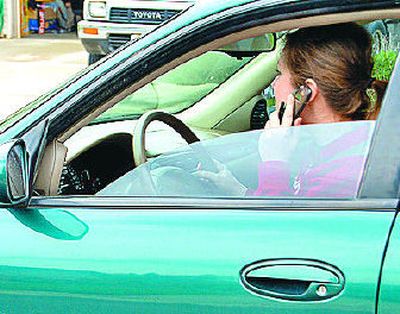Driver phone use banned

OLYMPIA – With a “hang up & drive” bumper sticker on the table next to her, Gov. Chris Gregoire on Friday signed a new law that will ban drivers from holding cell phones to their ears.
She also signed a similar bill banning text-messaging while driving.
“We know it’s happening,” Gregoire said of text-messaging drivers, citing a Seattle highway pileup in December allegedly caused by a 53-year-old man checking messages on his Blackberry. “It makes common sense that you need to see as your first priority public safety and driving the vehicle.”
She was surrounded at the bill signing by state troopers, lawmakers and a 12-year-old Bellevue boy left in a coma for nearly a month in 2003 after being hit by a woman allegedly driving while talking on a cell phone.
“He was getting on a school bus,” said Seattle safety advocate Andrea Okomski. “She clipped him and kept on driving.”
When the ban takes effect in July 2008, Washington will be at least the fifth state – after California, Connecticut, New Jersey and New York, – to ban the use of handheld cell phones while driving. But the law is enforceable only as a “secondary offense,” meaning that a motorist must also be committing some other offense in order to be pulled over and cited for using the cell phone.
“To me, this legislation is the beginning, not the end,” said Okomski, whose own son was left in a four-month coma three years ago after being struck by a driver chatting on a cell phone. She now heads up a crash-victim’s advocacy group called Pedestrian Inroads.
The text-messaging ban – believed to be the first state law of its kind in the nation – takes effect in January. It, too, would be a secondary offense and would be punishable by a fine of up to $250. Dialing a phone or reporting an emergency or crime are exempted, as is the use of text devices for dispatching taxis or mass-transit vehicles.
Arizona, Connecticut, New Jersey and Oregon are considering similar “driving-while-texting” bans, according to prime sponsor Rep. Joyce McDonald, R-Puyallup.
She said an average driver trying to read and send text messages takes his or her eyes off the road 28 times a minute to look at the screen or peck out a response on a keypad.
“That’s a recipe for disaster,” she said.
Sen. Tracey Eide, D-Federal Way, and other lawmakers had been trying for seven years to get the handheld-cell ban bill passed.
“It’s about time,” Eide said.
According to the National Conference of State Legislatures, at least 28 states and the District of Columbia have laws regarding cell phones in vehicles. Some 38 states – including Washington – regulate the placement of TVs or DVD players in vehicles. Washington, D.C., goes further – banning reading, writing, grooming or interacting with pets while driving.
A spokeswoman for Verizon Wireless said Friday that the company has no problems with the handheld-phone ban.
“We’ve always advocated for our customers to be safe while driving,” said Georgia Taylor. The company would rather see a single statewide law, she said, than a patchwork of different rules varying from one city to the next.
The ban would not apply to people reporting an accident, calling for help, or using a speakerphone or headset. It also would not apply to amateur radio operators or to cell phones with a walkie-talkie-type function.
Many Republican lawmakers nonetheless argued and voted against the measure, saying that eating, applying makeup, shaving or dealing with unruly children are also powerful distractions for drivers. They noted that cell phones are implicated in only a small percentage of car accidents.
The NCSL report also cited a January survey by Nationwide Mutual Insurance, in which surveyed drivers acknowledged driving while daydreaming, fixing their hair, text-messaging, dealing with pets or children, or driving with a pet in their lap. Some also stated that they had driven while changing seats with passengers, reading books, watching movies, writing, nursing babies, putting in contact lenses, painting toenails, changing shoes, shaving, and, remarkably, while urinating out the car window.
“There is little agreement over which distractions pose the most significant threat or what should be done about them,” wrote NCSL transportation expert Matt Sundeen.
As for Washington, Okomski said that records from the Washington State Patrol indicate that over a nine-month period last year, cell phones were a factor in 889 crashes in the state.
“That sounds like a big number to me,” said Okomski. “What were those 889 telephone conversations about? Were they more important that somebody’s life?”
WSP spokesman Bob Calkins said the agency thinks that cell phone involvement in crashes is “grossly underreported,” since drivers in collisions are not likely to volunteer that they were chatting on the phone or sending text messages at the time.
“Some things just aren’t a good idea,” Calkins said of holding a phone while driving. “Your mother told you not to run with scissors.”